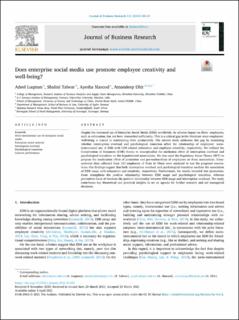| dc.contributor.author | Luqman, Adeel | |
| dc.contributor.author | Talwar, Shalini | |
| dc.contributor.author | Masood, Ayesha | |
| dc.contributor.author | Dhir, Amandeep | |
| dc.date.accessioned | 2021-06-14T08:46:18Z | |
| dc.date.available | 2021-06-14T08:46:18Z | |
| dc.date.created | 2021-04-08T13:33:51Z | |
| dc.date.issued | 2021-04 | |
| dc.identifier.citation | Luqman, A., Talwar, S., Masood, A., Dhir, A. (2021) Does enterprise social media use promote employee creativity and well-being? Journal of Business Research, 131, 40-54. | en_US |
| dc.identifier.issn | 0148-2963 | |
| dc.identifier.uri | https://hdl.handle.net/11250/2759188 | |
| dc.description.abstract | Despite the increased use of Enterprise Social Media (ESM) worldwide, its adverse impact on firms’ employees, such as exhaustion, has not been researched sufficiently. This is a critical gap in the literature since employees’ well-being is crucial to maintaining their productivity. The current study addresses this gap by examining whether interruption overload and psychological transition affect the relationship of employees’ socio-instrumental use of ESM with ESM-related exhaustion and employee creativity, respectively. We utilized the Conservation of Resources (COR) theory to conceptualize the mediation effect of interruption overload and psychological transition on the hypothesized associations. We also used the Regulatory Focus Theory (RFT) to propose the moderation effect of promotion and prevention-focus of employees on these associations. Cross-sectional data collected from 323 employees of firms in China were analyzed to test the proposed associations. Our findings suggest that both interruption overload and psychological transition mediate the association of ESM usage with exhaustion and creativity, respectively. Furthermore, the results revealed that promotion-focus strengthens the positive relationship between ESM usage and psychological transition, whereas prevention-focus of weakens the positive relationship between ESM usage and interruption overload. The study contributes key theoretical and practical insights to set an agenda for further research and aid managerial decisions. | en_US |
| dc.language.iso | eng | en_US |
| dc.publisher | Elsevier Ltd. | en_US |
| dc.rights | Navngivelse 4.0 Internasjonal | * |
| dc.rights.uri | http://creativecommons.org/licenses/by/4.0/deed.no | * |
| dc.subject | produktivitet | en_US |
| dc.subject | sosiale medier | en_US |
| dc.title | Does enterprise social media use promote employee creativity and well-being? | en_US |
| dc.type | Peer reviewed | en_US |
| dc.type | Journal article | en_US |
| dc.description.version | publishedVersion | en_US |
| dc.rights.holder | © 2021 The Authors | en_US |
| dc.subject.nsi | VDP::Samfunnsvitenskap: 200::Økonomi: 210 | en_US |
| dc.source.pagenumber | 40-54 | en_US |
| dc.source.volume | 131 | en_US |
| dc.source.journal | Journal of Business Research | en_US |
| dc.identifier.doi | 10.1016/j.jbusres.2021.03.051 | |
| dc.identifier.cristin | 1902983 | |
| cristin.ispublished | true | |
| cristin.fulltext | original | |
| cristin.qualitycode | 2 | |

